NEW YORK CITY: The humanitarian crisis in Yemen, already one of the most dire in the world, threatens to get even worse should Israel continue to attack Hodeidah seaport and Sanaa airport and puts them out of action, the UN warned on Friday.
Julien Harneis, the organization’s resident and humanitarian coordinator for Yemen, said the number of people in the country in need of aid to survive is expected to reach 19 million in the coming year.
Speaking from Sanaa, he said Yemen, the poorest country in the Arabian Peninsula, has the second-highest number of malnourished children of any nation, and ranks third in terms of food insecurity.
The civil war there, which has dragged on for nearly a decade, has decimated the economy and left millions of civilians without access to the basic necessities of life, he added. The country is in the throes of a “survival crisis” and the number of people unable to access healthcare services is one of the highest in the world.
On Thursday, Israeli warplanes struck the international airport in Yemen’s capital, Sanaa, as well as seaports and power stations on the Red Sea coast, killing at least four people. Israel’s prime minister, Benjamin Netanyahu, said the attacks were a response to more than a year of missile and drone attacks by the Iran-backed Houthis, and were “just getting started.”
The Houthis began attacking Israel and international shipping lanes shortly after the start of the war in Gaza in October 2023. They have vowed to continue as long as the war goes on.
UN Secretary-General Antonio Guterres condemned the Israeli airstrikes and said he was “gravely concerned” about the intensified escalation of hostilities. He said the strikes on the airport and seaports were “especially alarming,” and warned that they pose “grave risks to humanitarian operations” in the war-torn country.
Harneis, who was in the vicinity of the airport during the strikes, told of the destruction of its air traffic control tower, which left the facility temporarily nonoperational. A member of the UN staff was injured in the strike, and there were significant concerns about the safety of humanitarian workers in the area, he added. The airstrikes took place while a Yemeni civilian airliner was landing, additionally raising fears for the safety of passengers.
The airport is a critical hub for the delivery of humanitarian aid, and a key departure point for Yemenis seeking medical treatment abroad. Harneis said destruction of the airport would have far-reaching implications for international aid operations and the ability of Yemenis to access life-saving healthcare.
Hodeidah seaport is another focal point for humanitarian efforts in Yemen, with 80 percent of the country’s food and 95 percent of medical supplies arriving through this gateway. The recent airstrikes, which damaged tugs used to guide large ships, have reduced the port’s capacity by 50 percent.
“Any damage to this crucial facility would only deepen the suffering of the Yemeni population,” Harneis warned. He also reiterated that the one of the UN’s tasks is to ensure the harbor is used solely for civilian purposes in accordance with international law.
In addition to the immediate physical dangers airstrikes pose to its staff, the UN is also grappling with the detention of 17 of its workers by the Houthis, which casts another shadow over humanitarian operations.
Harneis said the UN has been in negotiations with the Houthis in Sanaa and continues to work “tirelessly” to secure the release of detained staff.
About 3,000 UN employees are currently working in Yemen, Harneis told Arab News, and the ongoing detentions and the threat of further airstrikes continue to create an atmosphere of anxiety. Given these risks, the emotional toll on staff is significant, he said.
“Many colleagues were very anxious about even coming to the office or going out on field missions. It’s very heavy for everyone,” he added.
Though there have been some improvements in operating conditions for humanitarian workers in recent months, Harneis said that when staff see that 16 of their colleagues are still detained “there’s obviously a great deal of anxiety.”
He added: “Then if you add in to that air strikes and the fear of more airstrikes, there is the fear of what’s going to happen next? Are we going to see attacks against bridges, roads, electricity systems? What does that mean for them?”
Despite the challenges to aid efforts, Harneis stressed that as the situation continues to evolve it is the response from the international community that will determine whether or not Yemen can avoid descending even more deeply into disaster.
























